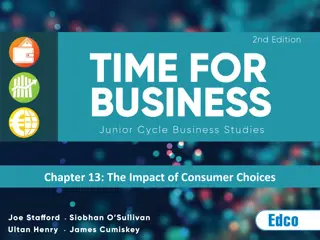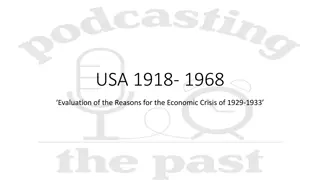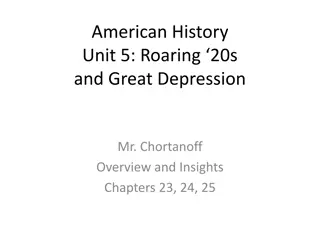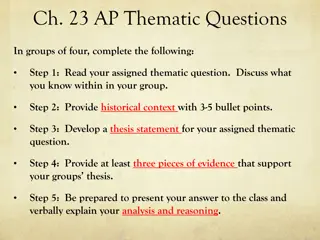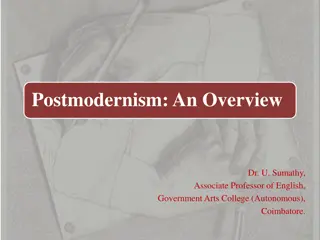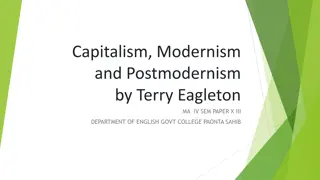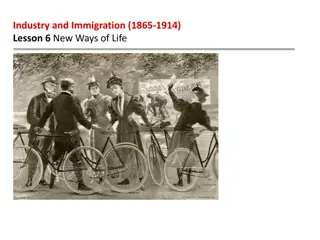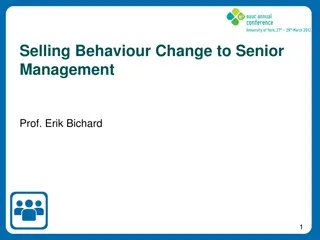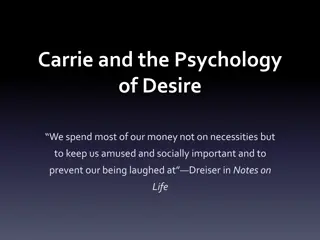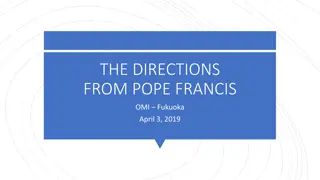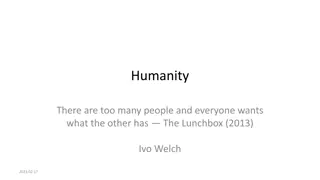The Impact of Consumerism on Society
Consumerism has become a defining aspect of modern society, influencing our behaviors, values, and relationships. The constant pursuit of material possessions and social validation through consumption has led to a culture of excess, wastefulness, and environmental degradation. This mentality of acquiring and discarding without thought for the consequences has deep-rooted effects on our well-being, environment, and communities.
Download Presentation

Please find below an Image/Link to download the presentation.
The content on the website is provided AS IS for your information and personal use only. It may not be sold, licensed, or shared on other websites without obtaining consent from the author. Download presentation by click this link. If you encounter any issues during the download, it is possible that the publisher has removed the file from their server.
E N D
Presentation Transcript
2003 Overall, we use consumerism for fulfillment Social media has become our system of self- value, and the objects we work to buy the physical representations of our worth. This quote sheds light on that fact that consumers do not have the desire or will to change their habits. Consumers do not want to miss out on what is in. In recent years, this phenomenon has started being referred to as fomo which quite literally means fear of missing out. This encompasses consumer products as well as social gatherings. In both of these cases, consumers fear that if they do not have the right product or do not attend the right social event they will have a less fulfilling and meaningful existence
Our consumption defines us and as we consume, computer algorithms record our online activity and purchases, calculating our desires and feeding back too us more things to buy. Thus we consume and consume, never questioning how we now interact with machines rather than with people and the earth. The line, destroy what they do not understand, doesn t mean the physical destruction of the planet, but humanity s current relationship with it. We live in a world where we do not think anymore. We do not plan for the future. We do not think about the world in terms of large scale. Instead we are narrow minded and concerned about ourselves. We care about how many likes we get on Facebook and taking photos every moment of our lives to post on Instagram.
If our number one priority, consciously and subconsciously, is consumerism, nothing will ever change in regards to the destruction we are doing to the environment locally and globally. Just as the quote says, we do not understand out relationship and impact on our earth, so we use, abuse, and destroy what we don t understand. However, although my generation and people of today more generally may manifest this consumer mentality in slightly different ways than it was manifested during the latter half of the 20th century, the essential attitudes and mentality of consuming and acquiring as much as possible has remained intact. Berry astutely sums up this state of total consumerism in which we currently live as a state of helpless dependence on things and services and ideas and motives that we have forgotten how to provide ourselves. I see every day this state of helpless dependence of people on material objects and goods they have bought, which has further led to all meaningful contact between ourselves breaking.
Is Island, 1962 The final pillar, planned obsolescence, is the most environmentally devastating, because it necessitates not only incomprehensible quantities of waste, but also provides the justification for the constant extraction of resources from the Earth at an ever- increasing rate We have been raised in a society that favors consumerism, materialism, and polarization. Consumerism makes us blind to the world around us; we take and take until there is nothing left for our fellow human. Materialism makes us greedy. It makes us care only for what we covet and gaining social status from our possessions.
This is the very reason our society is the consumptive monster it is today. We have altered our measure of status, significance, rituals and all around way of life from the bombardment of consumerist ideals. 1978, Harvard
We are not born into the world dressed sharply, toting new gadgets. It is only once we are exposed to the rampant commercial inundation that these feelings of emptiness fester, longing to be filled by materiality. 1991 Finally, I think another big message the quotes are trying to make is that we are too obsessed with ourselves. One of the quotes makes an excellent point about this, saying that our desires, sense of identity, and memories are replicated and then sold back to [us] as products. Indeed, we are so obsessed with our own well-being that we put lots and lots of money into trying to achieve a sense of self in the form of a new sweater or car.
1993 In America, one s cultural capital is inexorably linked to material wealth; a view of Social Darwinism reigns, where the dominant perception is that those without riches are inherently worse than the wealthy, and are lacking in some fundamental value which makes them incapable of bettering their own situation. The ultimate cruel joke in our wanton consumption is that many of the most environmentally-responsible groups of people on the planet will suffer from our negligence and self-absorption; and yet, we would rather have this reality than to give up one iota of our consumer-based lifestyle.
Anyone who has walked ten minutes into a forest, stood on top of a mountain, or gazed out into the endless ocean, has seen beyond this illusion, beyond wars and brands and social networks. In that moment, it s impossible to ignore the dominance of the planet it demands a spiritual reverence. Yet, instead of giving into that feeling, most of us fight to forget it once we hike down the mountain or walk back out of the woods. Because changing our behavior to re-prioritize the earth means rejecting all that we know to be true. We live in a masturbatory circle of self- worship. But it will be over soon if we don t wake up.
At what point we lost our connection with nature, I am not sure. But I do know that the result was, as the quotes denote, a planet of consumption. Our species has lost the ability to see the connection between nature and our habit of never ending consumption. We literally go insane because our consumption never satisfies our deepest need for connection and true happiness. We continue to hopelessly consume the world s offerings, from apple watches to the American Dream. We are told that a simple life without electronics and a successful career and a happy family is a pointless life.



